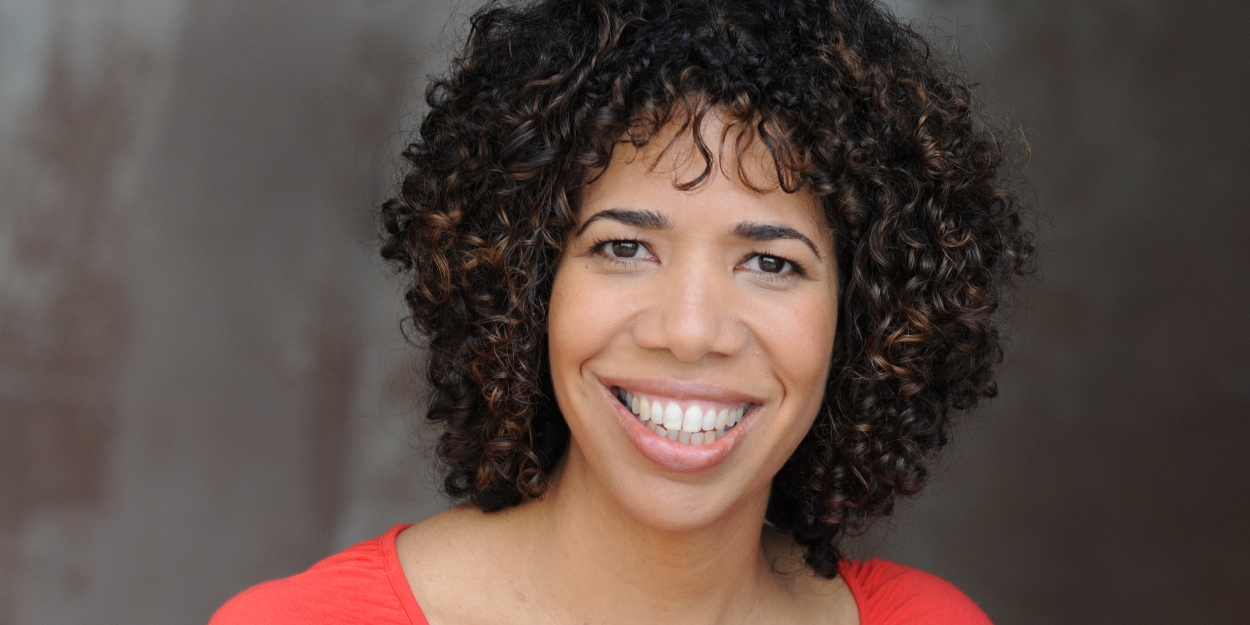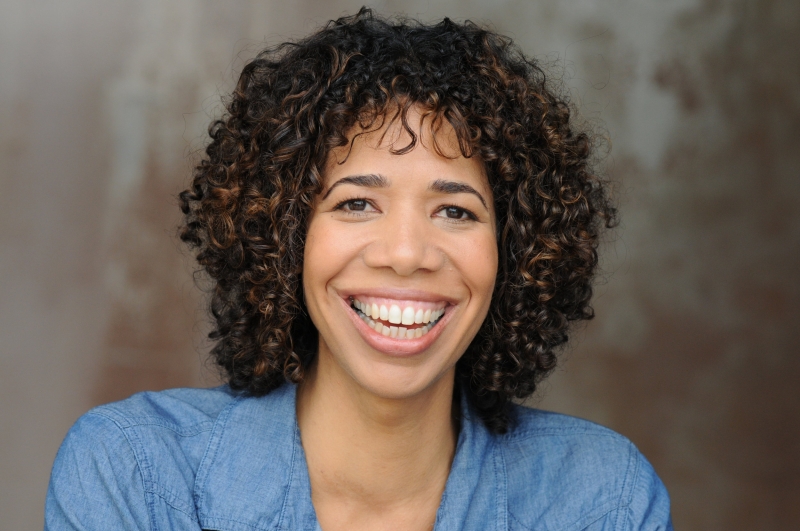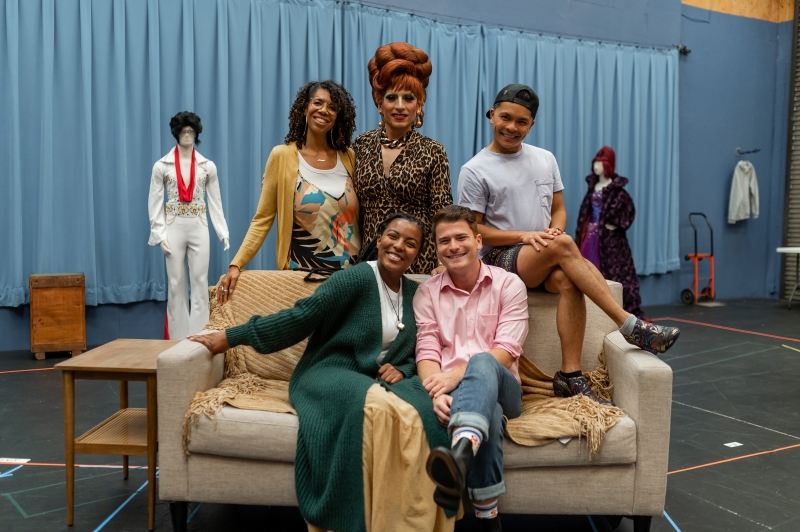Interview: Elizabeth Carter of THE LEGEND OF GEORGIA MCBRIDE at Center Repertory Company Explores How the Drag World Can Teach Us to Live Our Lives with Authenticity
Carter directs Matthew López's heart-warming celebration of chosen families in Walnut Creek November 4th to 26th


(photo by Lisa Keating)
Elizabeth Carter’s career seems to be firing on all cylinders these days. The prolific director-actor’s latest project is helming Center Repertory Company’s The Legend of Georgia McBride in Walnut Creek, marking the sixth show she has directed just this year. Written by Tony and Olivier Award winner Matthew López (Broadway’s The Inheritance and Some Like it Hot, Amazon Studios’ Red, White & Royal Blue), this delightfully spirited and heartfelt show centers on an Elvis impersonator who loses his longstanding gig as “The King” when rent is overdue and his wife has a baby on the way. A drag show moves in, and with the help of new friends who become his chosen family, the former King transforms into a fabulous queen.
The production is Carter’s return to Center REP after helming last season’s well-received production of Lynn Nottage’s Pulitzer Prize-winning Sweat. Among her other recent directorial credits are Wolf Play for Shotgun Players, Confederates for St. Louis Repertory Theatre, Steel Magnolias for TheatreWorks Silicon Valley, Every 28 Hours Plays and A Place to Belong for American Conservatory Theater, and Stoop Stories for Aurora Theatre Company. She also served as associate director on the ripple the wave that carried me home for Berkeley Repertory Theatre and Goodman Theatre and assistant director for How I Learned What I Learned at Oregon Shakespeare Festival.
Carter has also been branching out into directing works for the small and large screen. Her groundbreaking 2020 virtual King Lear for SF Shakespeare Festival was a notable success during the early days of the pandemic, and her directorial film debut Bottled Spirits just won Best Narrative at the London Pan African Film Festival. She was also awarded a 2023 Lucas Artists Fellowship. She’s clearly got a lot on her plate these days.
I spoke with Carter by phone last week shortly after she’d led her Georgia McBrdie cast through their first full run-throughs and was feeling excitement over how well the rehearsal process has been going. We talked about what initially drew her to the play, its renewed relevance in light of the political movement to legislate against drag, the challenges and fun of working on a play about the drag world, what it was like to direct her first film and whether she still has a desire to keep acting. Carter is one of those vivacious and endlessly creative individuals who always seems to come from a place of positivity even when addressing serious issues like racism, transphobia and homophobia. It is readily apparent why so many people want to work with her. The following conversation has been edited for length and clarity.
How is it that you came to direct this production?
I actually was approached about directing this last year for Center REP. It was one of the plays that they were interested in and I said I wanted to direct Sweat because it’s such a meaty piece. Then CRC checked back in with me about it and I said, “Actually, yeah, I’d like to direct this.” In light of all the things that are happening in Florida and other states, and this sort of hyped up, fabricated paranoia about drag, it felt like now is the time to do this play and sort of use it as a way to celebrate people being able to live in a way that’s their authentic selves. We’re celebrating drag and we’re saying drag doesn’t hurt anybody. In fact, it’s a way to live with agency and to play.
Mostly, the play is about coming into your own and discovering something about ourselves and moving past fear and shame to live as our full, authentic selves. It’s also about the beauty of not just the drag community, but the LGBTQIA community. It is really expansive and inclusive, and there’s a lot of space within it. That love and that fierceness and that ability to fight for people to be who they are ripples out into the community.
How familiar were you with the drag scene before taking this on?
Most of my drag experiences have been with my son. We went to a lot of Drag Story Time as a family or went into San Francisco (I live in the East Bay) to see Easter events by the Sisters of Perpetual Indulgence and those kinds of things. But going to more adult drag shows wasn’t something I did until more recently, mostly because as a queer person married to a woman, most of the stuff in the East Bay that I was participating in weren’t really drag shows. I was going to women’s clubs, so it was just a different thing, you know?
But there’s this wonderful, rich history in San Francisco, and the consultant on our show, Chris Steele (who is Poly Amber Ross), is a fantastic theatermaker and drag artist. As I started to think about the show, I got really excited by learning about like drag in the South compared to drag in San Francisco, and the different ways that people approach their drag performances and personas. That was really fun for me because the level of creativity and just the variety can be pretty broad. In San Francisco it’s a little more commentary and a little more underground, at least the folks that I’ve seen. In South you have more pageant drag, which is more about beauty and perfecting a look.
It was also interesting to me the way that some people are about impersonation, you know becoming a person and really giving the audience that sort of take, like Judy Garland or Barbra Streisand or Britney Spears. And then some people are themselves and are using the music to tell different kinds of stories. Some people are very comedic and use the cuts and the edits to be super playful. Some people are really movement-oriented. So there’s all this variety and it’s been really fun trying to figure out what the playwright wanted for the three drag performers in the show.

(photo by MacKenzie Crane)
What do you think you bring to this play that another director might not?
Well, I think that I get to the heart of things. This play asks us to feel things, to root for people, but also to mine it [for deeper themes]. Another director could see this and be like “Ah, it’s fun and light, here we go!” But the way I look at things always is that for every side of joy there’s also hurt. In order for the fun and the comedy to land, there has to be something really real underneath it. And there is something really real underneath it here. There is still homophobia, there is transphobia, there is oppression that makes us have shame and makes us hide. I’m trying to mine that for the characters, to hold that truth so that it can be a full piece.
So that is what [I bring to the piece], besides the fact that I’m I think really good with actors, and have a willingness to just be irreverent and have fun. Like let’s have a good time, but also let’s do it with integrity, because it needs to still be handled with care and depth so that when people walk away hopefully they’re also thinking about their own selves. They didn’t just come to be entertained. They came to look at themselves a little bit and say, “Huh, is there something that I always wanted, that I always thought about myself, that I’ve wrestled with accepting in myself, and can own that?” That’s always my goal. That’s what maybe sets me apart from another director.
The last time that we talked, you said that if somebody asks you to take on a project and it scares you a little, you usually say yes. Did anything scare you about this one?
Well, the story didn’t scare me, but what actually did was more technical things, like “How am I gonna do a medley where the playwright gives you no forgiveness?” There’s no forgiveness! The playwright just literally says “There is a medley of songs.” I mean, he gives you some parameters, like this character leans more classic drag. And then at the end he says, “There is a finale.” That’s pretty much it so it was like “I better make the right choices.” How do I honor the drag community and make sure it is truthful to them – and also can be enjoyed by people who don’t engage in that world at all, that they can recognize it, can get excited, make it a celebration?
The fun and the challenge for me was number one, to make sure it had some depth, that each person had their own real story. And then second was making sure that these numbers work. We have seven songs in the medley, they happen sort of back-to-back and there’s a costume change for each one. Like characters have to change makeup within 30 seconds. And it has to be that way cause it’s drag, and that’s the magic of drag, right? It’s wigs and reveals and learning all of those little tricks about how to build a drag number. I’ve never done that so that was exciting to me.
It's kind of like doing a mini-musical in a way. I’m calling it a “musical-ette.” [laughs] Not that it isn’t a totally full piece, but it has some of those elements, and I would love to direct a musical.
It sounds like think this may be setting you up to direct Dreamgirls, which has all those montage sequences.
That’s a fantastic musical. I would love to direct Dreamgirls cause that show’s got everything in it. Actually, I was in that musical many years ago at the Willows out in Concord. I don’t think it exists anymore, but they did a lot of musicals. I was in the show and I was the understudy for Effie. I ended up going on as Effie the last week, finishing the whole run, which was terrifying and exhilarating all at once.
You were named a 2023 Lucas Artists Fellow, which comes with a three-month residency to be used at your discretion over a 3-year period. What do you plan to do with your residency?
I am really excited to delve into this 1916 play about – well, in my head – Black motherhood written by Angelina Weld Grimké, and it’s been sort of circling me a little bit. I did a reading of it at OSF [Oregon Shakespeare Festival] just to hear the play, and I have some ideas about it, so I want to use my residency to work with a dramaturg and with Regina Victor, who used to be here and is now in Chicago, to kind of pull apart the play, look at Grimké’s life and see how I might adapt it, or what it wants to tell me, basically.
I think it’s historically a very important play. It’s one of the first plays ever to be performed in front of an integrated audience, and I want to play with it and see what her life tells me. I just feel like it’s something that I want to make something of my own. I’m really great at interpreting other people’s words and giving them life and imagination and physicality, and hopefully heart, and this feels like something that I want to wrestle with and explore for myself over the course of the next three years.
That sounds really interesting. As wonderful and heartening as it has been to see so many Black women playwrights getting their work produced recently, I sometimes get a little annoyed when they’re trumpeted in the press as “firsts.” Black women were writing plays long before this current wave and I fear their pioneering works are being forgotten.
Yes, exactly, and this is a piece that should be in the canon. It has some melodramatic aspects, it’s of its time, but it also holds totally true. I read it out loud with actors and was like, “Whoah! This is billed as an anti-lynching play, but to me it’s about Black women when they have to choose whether or not to be mothers in the face of racism. That is a story that is still extremely current.” And when I started to do a little research on the playwright, I was like “Oh, your story is interesting.” So there’s something intersecting those two pieces that I just don’t know what it is yet. I have a lot of ideas about how to dive into it, and I want to give myself the space and time to be able to explore that.
You also recently made your film directing debut with Bottled Spirits.
Omigosh, that was so exciting. I worked on it with Black Lives Black Words and OSF when I there. The film was written by Cat Brooks and stars Margo Hall, who’s very dear to me and graciously said yes to the project. We worked with an almost entirely Black crew in West Oakland and filmed it all in three days at Esther’s Orbit Room, which has been closed for many years, so we were in this sort of time capsule of a space.
The beauty of the project was it was designed by Black Lives Black Words as a way to work with Black directors and playwrights and give them an opportunity to work in sort of a hybrid film format. We just won the London Pan-African Film Festival Award for Best Narrative and Best Actor, which is pretty cool. It’s just starting to get out there and we will have a local screening, we’re working on the exact date for that.
I actually come out of a background of a little bit of photography in my younger years. I also think that directing Lear virtually helped, because it basically was this hybrid of almost television directing in some ways and composing on a screen. I love theater, it’s where my heart is at, but I feel being able to create in different mediums enriches me all the way around. Like I said, I like to do things I’ve never done before. I like to jump into something new and I feel so grateful that this film has gotten a great reception so far.
Do you have any other theater directing gigs coming up that you’re especially excited about?
Yes! I will be doing CalShakes’ 50th anniversary production next summer as they kind of come back from some time away. I’ll be directing As You Like It, which will be really fun. I have some ideas! [laughs]
Are you still interest in working as an actor?
You know, the thing I’m figuring out about being a director is you’re hired so much further out than the actors are, so I’ve been asked to audition for things, but I’m already booked out in those timeframes. But I would love to keep acting, and I was just thinking about this because I’m Equity. I was like “I haven’t acted in a little while, but I’m not giving up my card because that role’s gonna come along where I’m gonna be like ‘I need to do this!’” Because I feel like being an actor has made me a better director. And I think when I’m acting, that feeds being a director, helps me understand what part of the story I need to enhance so that I can tell the story that the director is wanting to tell.
I do still love acting, and would [again] if my schedule will allow. It’s been a very busy year. I’m on show number 6 right now, so it’s been very, very busy and I think my family will be really happy to get me back for a little while!
---
The Legend of Georgia McBride will perform November 4-26, 2023 at the Lesher Center for the Arts, 1601 Civic Dr, Walnut Creek. For tickets and more information, visit LesherArtsCenter.org or call the box office at (925) 943-7469 (open Wed-Sun, 12:00pm-6:00pm).
Comments

Videos

